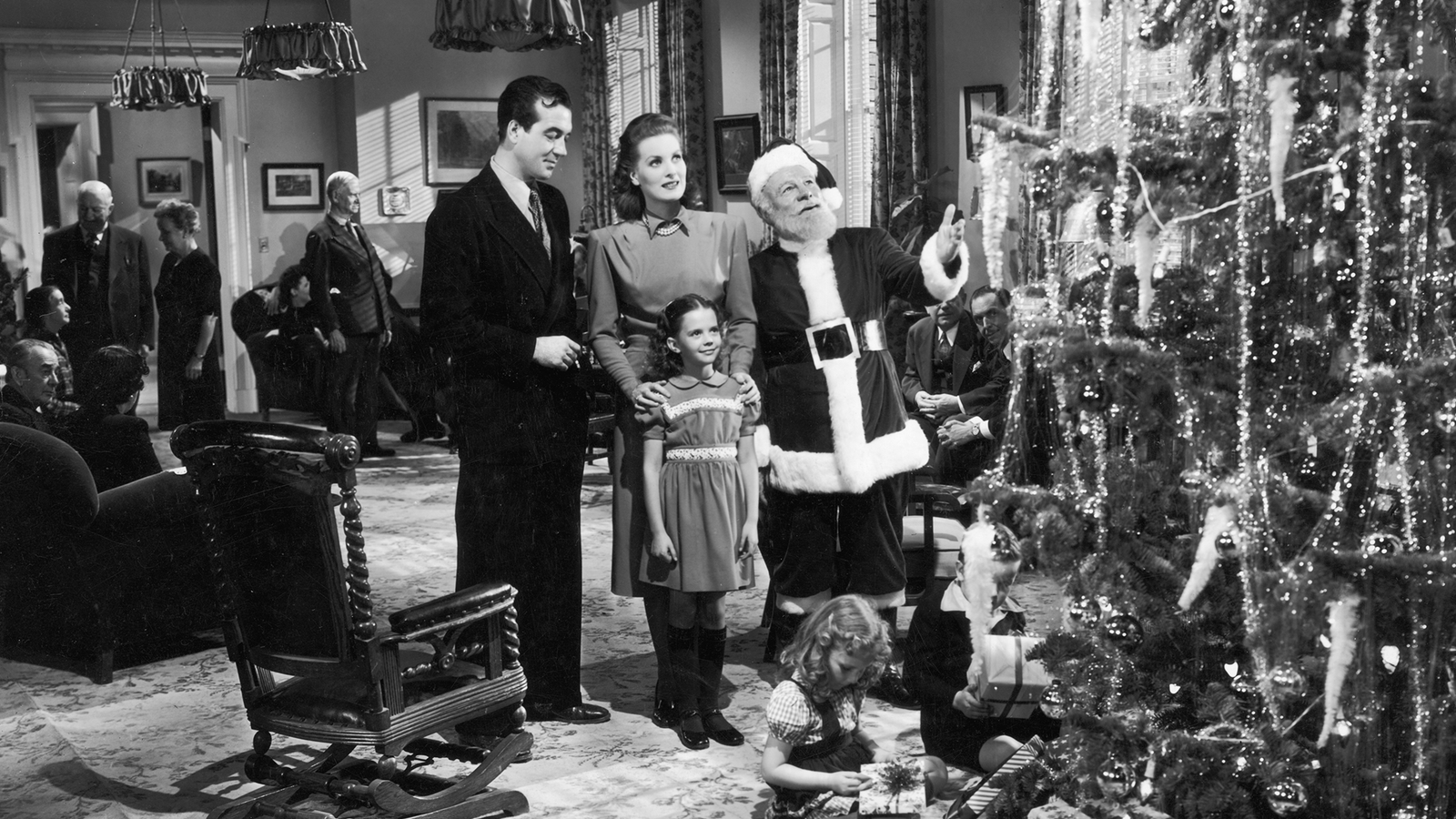My Christmas movies series has hitherto considered church (The Bishop’s Wife), work (The Shop Around the Corner), and family (Christmas in Connecticut), the communities that constitute America. I’ll conclude with the most famous American Christmas fairy tale of all, Miracle on 34th Street (1947), in which faith, commerce, and even marriage are all in trouble, as they are today. The story is straightforward but unpredictable: the real Kris Kringle (Edmund Gwenn) takes a job as a store Santa, a step down from myth, but a more reliable method of Christmas toy delivery, but his loving dedication to children and therefore to the families who want to make them happy lands him in court—and he barely gets off on a technicality!
Kringle finds out that modernization is making it harder for people to believe in Christmas—materialism is replacing joy. Although Americans accept him on the democratic basis of equality, they can’t believe he’s Santa himself. In fact, if you’re not Progressive, you might think this movie less endearingly entertaining than shockingly prophetic. It was hilarious to put Santa on trial in 1947, but we dare not laugh when the Little Sisters of the Poor (or some guy running a cakeshop) have to defend religious freedom against federal government attacks. So we should consider the movie together with the changes that have occurred over the three postwar generations.
As with government, so with business. Back in 1947, Macy’s gladly became the setting for this fairy tale, which opens with its famous Thanksgiving parade and ends with a man playing its CEO testifying on behalf of Santa in a court of law. The all-American life of commerce is the backdrop of the movie, and Kringle even makes commerce more generous and more successful by giving shoppers the best advice for gifts for their kids, regardless of corporate or branding interests (“We don’t carry that brand, but I think Gimbel’s does”). Nowadays, giant corporations routinely threaten entire U.S. states with economic reprisals over questions of faith, whether it’s objections to abortion, homosexual marriage, or transgender issues. Indeed, we have organized the trial of Santa as culture wars, or the war on Christmas, or woke capitalism.
The family is also in terrible trouble—it’s no longer just the little girl Susan (Natalie Wood) who refuses to believe in Santa because she has neither father nor home. A large minority of children, especially among poorer Americans, are fatherless. Like her, they seem unable to believe in miracles. Kringle couldn’t hope to make a marriage happen today as he does in the movie, since young men and women are far likelier to blame each other than seek love together. Funny how these old corny pictures have turned out to be bitterly realistic …
Once you see how much we’ve lost, you can see as clearly what these middlebrow movies were trying to protect. Santa Claus is God for kids. Exchanging gifts recalls Christ’s command of charity and offer of grace. That’s what Christmas gifts are ultimately meant to recall to mind. They are about our essential neediness and who might provide for it.
Christianity used to be America’s faith, and it started at home and, indeed, helped make sense of the protection of home. Home lost, the rest must fall! The movie was also prophetic in showcasing Doris, Susan’s single mother, played by the great Maureen O’Hara, who hires Kringle—her identity comes from business; she has almost no private life. Such women now dominate colleges and the most important part of corporate America. Perhaps many or most are as unhappy as Doris, but it would take more than a miracle to persuade such successful people to get back to family.
Our America, unlike the movie’s, excludes Santa and his generosity. Our tech corporations want to own as much of the internet as possible, to persuade people to spend their lives in their domains. It seems we have much to learn from the fairy tales our grandparents favored. Instead of the loyalty Macy’s engenders in the movie, our tech corporations have cult-like followers, whether consumers or employees. Indeed, the tech campus announces not just a perpetual college life but also a new birth of the company town. People increasingly live as much as work there, but perhaps in a new configuration, excluding family, as the tech excludes privacy. The hope is to replace America by the metaverse.
Like Kringle, our new corporations want to mix doing well with doing good—that’s all-American. But they replace loyalty with class contempt. They ban popular opinions and bully ordinary Americans, although the evidence that tech CEOs are impartial, wise judges and censors is scant. Many who desperately wish to be part of the future nevertheless join the moral-tech censorship enterprise and even embrace the contempt they can thus feel for their fellow Americans.
This is one more reason to take Christmas seriously. If it makes us more joyful and grateful, we will be less restless, less desperate to be part of a utopian future, and therefore less likely to worship tech CEOs. The excitement invested in each next Apple gadget is, of course, idolatry. Pity the people who so misunderstand their humanity that they think a gadget is the future—as though the corporation that supplies them with an identity upon purchase really cared about them or could make them as immortal as technology rather than as perishable as each gizmo. Perhaps they’re just kids who confuse toys with life.
So if businesses now are hostile to most Americans, especially Christians, why does the movie suppose it was ever different? The answer is loyalty—before globalization, a business’s reputation mattered; it affected the bottom line. There were limits on commerce. But the movie is again realistic, it makes us ask: Do businesses treat customers like human beings because they respect humanity, or because it’s profitable? If it’s profit, well, conditions might change; their pretense of Christian humanity might be abandoned in favor of, say, woke religion.
Miracle on 34th Street uniquely made a public rather than a private case for Santa. The unsatisfying plot resolution involving mailmen could be read very seriously to point to what Lincoln said, that public sentiment undergirds or undermines the laws in America. So the only support for Santa, and thus faith in miracles publicly expressed, must be the people. In the movie, the action of a few mailmen forces the American public to decide where they stand. Might we face a similar test ourselves? In the movie, Christmas is both too commercial and rather innocent, thus still connected to Christianity. What’s Christmas like in reality?
The 1994 remake was also a big success—it was co-written and co-produced by John Hughes, who made America’s cult hits about teenagers in the ’80s (Sixteen Candles, The Breakfast Club, Pretty in Pink, Ferris Bueller’s Day Off) and then America’s blockbuster family movies in the ’90s (the Home Alone and Beethoven franchises). He ended up a hack working for Disney remakes (101 Dalmatians, Flubber), but in Miracle on 34th Street, he tried to bring the two sides of America together, faith and commerce.
Hughes understood that the original had an astonishingly weak ending—mailmen in the Dead Letter Office decide to deliver the hundreds and hundreds of kids’ letters to Santa to Kris Kringle himself, who just happens to be on trial at the moment, thus giving the mailmen a physical address. The U.S. Post Office is a federal agency, indeed, it’s in the Constitution, so that means the government has vouched for Santa! Hughes replaced that nonsense with something more obvious and more important: In God We Trust—the motto on each and every one of our bills. Money and God go together in America, so that’s how the judge decides that you cannot arrest Santa for madness.
Hughes also dramatized conflict better, choosing a corporate advertising war, typical of the ’90s. This revealed how commerce can make us cowards, since bad advertising can be catastrophic for business. Unfortunately, Hughes connected this to typical New Age hippie spirituality—belief is just something we do: We have to believe in magic to feel better, which both Hollywood and advertising sell, and we’ll find meaning in empty gestures. Sure they’re just symbols, but we need them. This mars the remake; the sentimentality doesn’t help, being an obvious replacement for Christianity, now that the very mention of Christ is avoided in public life. Well, commerce might encourage cowardice, but so does New Age spirituality and the fear that none of us matter, so we shouldn’t say honestly what we believe because others will disapprove.
Better to be confident and happy at Christmas time. Grudge no man his own decent way of life, but share honestly joy, gifts, and faith, too. Perhaps fathers especially should take notice of this Father Christmas story, so influential in midcentury America. Their generosity is much needed now.

